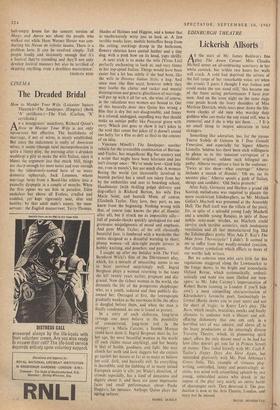EDINBURGH THEATRE
Lickerish Allsorts
A T the start of Mr. James Baldwin's fine ..play The Amen Corner, Miss Claudia McNeil seems an all-embracing sanctuary in her
white cassock, but within two hours her walls will crack. A cold had deprived the actress of the full range of her remarkable voice, yet when she croaks 'I guess I thought I was Joshua and could make the sun stand still,' this became one of the finest acting performances I have ever seen. And on the same night on the same stage lose petals brush the ivory shoulders of Miss Marlene Dietrich, while tears pour down the life-
worn cheeks of old men who worship their goddess who can make the sun stand still, who is immortal, and if she is why not them .. . It is no small thing to inspire adoration in total strangers.
. Something like adoration, too, for the joyous Teatro Stabile di Genova in l Due Gemelli Veneziani, and especially for Signor Alberto
Lionello. Seldom has there been such willingness to please as in this innocent corruption of 'a Goldoni original, seldom Such bilingual em- pathy. Alberto recognises a face in the audience: 'Twice at ziss show—what courrege I ' Alberto
includes a snatch of Hamlet: 'Oh no, zat ks anozzer play.' Alberto spout's a gush of Italiaa, shrugs and confides: 'Old Swiss proverb!'
After Italy, Germany and Harlem a grand (0 Scottish melodrama was required to placate the more recalcitrant Edinburghers, so Mr. Miehael.
Geliot's Macbeth was presented at the Assembly Hall. The Hall itself was the villain of the piece;
for, in spite of a splendid young Lady Macbeth and a sensible young Bangui), in spite of those nubile semi-nude witches, no Macbeth could survive such terrible acoustics, such inadequate
ventilation and all that manufactured fog. Did the Edinburghers prefer Miss Ada F. Kay's The Man from Thermopylm? I didn't. It seemed to me to suffer from that woolly-minded cynicism, that clumsy symbolism which afflicts so many of our worthy lady writers.
But We asbestos men who care little for fire regulations staggered along the Lawnmarket to the fringe shows, to the bright and iconoclastic
Oxford Revue, which systematically, enthusi- astically and none too soon libelled our teen-
agers; to Mr. John Cairney's impersonation of Robert Burns (coming to London if you'll bide awa'), a most compelling characterisation of Khrushchey's favourite poet, fascinatingly in- formal (Burns shows you to your seats) and not
far short of tragic; to Kerry Lee's play, The Burn, which insults, brutalises, mocks and finally
alienates its audience with a blatant and self- effacing dishonesty that one cati only in a horrified sort of way admire; and abbve all to the 'many productions at the amazingly diverse Traverse Theatre, which, its pioneering spirit apart, offers the only decent meal to be had for love (that doesn't get you far in Princes Street) or money. They failed bravely with Mr. Cecil P.
Taylor's Happy Days Are Here Again, but, succeeded gloriously with Mr. Paul Ableman's Green Julia. This example of virtuoso play-
writing, controlled, funny and penetratingly in- cisive, was acted with astonishing aplomb by two young, unheralded actors who drank in the course of the play very nearly an entire bottle of champagne each. They deserved it. The pro- duction is now at the Arts Theatre, London, and must not be missed.
DAVID BENEDICTUS


































 Previous page
Previous page